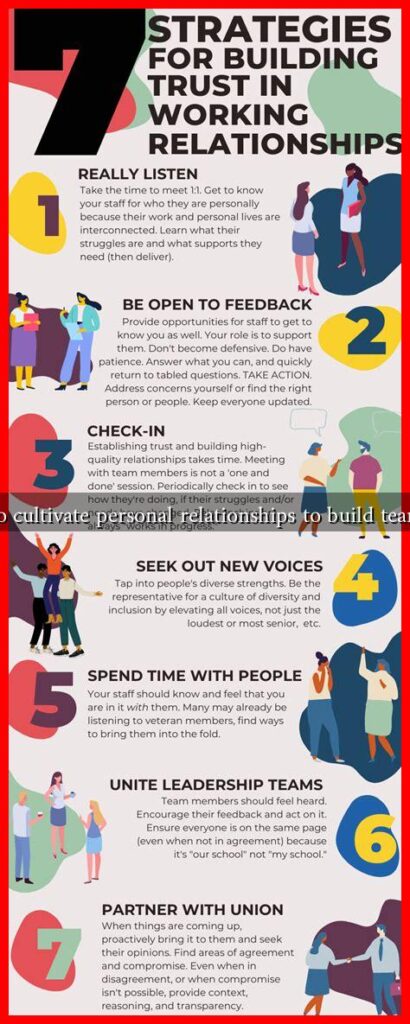-
Table of Contents
- How to Cultivate Personal Relationships to Build Team Trust
- The Importance of Trust in Teams
- Strategies for Cultivating Personal Relationships
- 1. Encourage Open Communication
- 2. Organize Team-Building Activities
- 3. Foster a Culture of Recognition
- 4. Promote Diversity and Inclusion
- Case Study: The Power of Personal Relationships at Zappos
- Conclusion
How to Cultivate Personal Relationships to Build Team Trust
In today’s fast-paced work environment, the importance of trust within teams cannot be overstated. Trust is the foundation of effective collaboration, innovation, and overall team performance. Cultivating personal relationships among team members is a powerful way to build this trust. This article explores strategies for fostering personal connections that enhance team dynamics and productivity.
The Importance of Trust in Teams
Trust is essential for any team to function effectively. According to a study by the American Psychological Association, teams with high levels of trust are more likely to achieve their goals and have higher job satisfaction. When team members trust one another, they are more willing to share ideas, take risks, and support each other. This leads to:
- Improved communication
- Increased collaboration
- Higher morale and job satisfaction
- Enhanced problem-solving capabilities
Strategies for Cultivating Personal Relationships
Building personal relationships within a team requires intentional effort. Here are several strategies that can help foster these connections:
1. Encourage Open Communication
Open communication is the cornerstone of any relationship. Encourage team members to share their thoughts, feelings, and feedback openly. This can be achieved through:
- Regular one-on-one check-ins
- Team meetings that prioritize sharing
- Anonymous feedback tools to ensure everyone feels safe to express themselves
For example, Google’s Project Aristotle found that psychological safety, which is fostered by open communication, is a key factor in high-performing teams.
2. Organize Team-Building Activities
Team-building activities can help break down barriers and foster personal connections. These activities can range from formal retreats to informal gatherings. Consider the following:
- Workshops focused on team dynamics
- Social events like happy hours or team lunches
- Volunteer opportunities that allow team members to work together for a common cause
For instance, a study by the University of Central Florida found that teams that engage in regular team-building activities report higher levels of trust and collaboration.
3. Foster a Culture of Recognition
Recognizing individual contributions can significantly enhance personal relationships within a team. When team members feel valued, they are more likely to trust their colleagues. Implement recognition programs that include:
- Peer-to-peer recognition platforms
- Monthly awards for outstanding contributions
- Public acknowledgment during team meetings
According to a Gallup study, employees who receive regular recognition are more productive and engaged in their work.
4. Promote Diversity and Inclusion
Diverse teams bring a variety of perspectives and experiences, which can enhance creativity and problem-solving. To cultivate personal relationships in a diverse team, it’s essential to:
- Encourage team members to share their backgrounds and experiences
- Provide training on cultural competence
- Create an inclusive environment where everyone feels valued
Research from McKinsey shows that diverse teams are 35% more likely to outperform their less diverse counterparts.
Case Study: The Power of Personal Relationships at Zappos
Zappos, the online shoe and clothing retailer, is renowned for its strong company culture and emphasis on personal relationships. The company invests heavily in team-building activities and encourages employees to form personal connections. This approach has resulted in high employee satisfaction and loyalty, which translates into exceptional customer service. Zappos’ commitment to building trust through personal relationships has been a key factor in its success.
Conclusion
Building trust within a team is a multifaceted process that requires intentional effort to cultivate personal relationships. By encouraging open communication, organizing team-building activities, fostering a culture of recognition, and promoting diversity and inclusion, teams can create an environment where trust flourishes. As demonstrated by companies like Zappos, the benefits of strong personal relationships extend beyond individual satisfaction to enhance overall team performance. Investing in these relationships is not just beneficial; it is essential for long-term success.
For further reading on building trust in teams, consider exploring resources from the American Psychological Association and McKinsey & Company.


